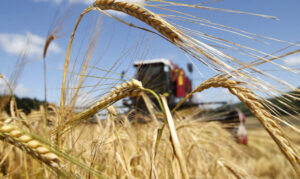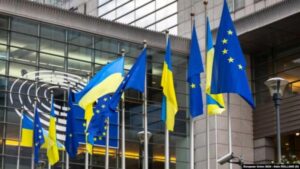
The number of written appeals to the National Bank of Ukraine on the activities of insurance companies in the second quarter of 2025 decreased by 9.3% – to 321, oral appeals through the contact center – by 18%, to 41, according to the report on the work with appeals of consumers of financial services in the mentioned period.
“We observe a tendency to decrease the number of written appeals on the work of financial, collection companies and insurers. At the same time, we note an increase in the number of questions regarding the work of banks of all forms of ownership,” the report says.
It is noted that the share of identified violations in written appeals regarding the activities of insurers is 22%, state banks – 2.8%, private banks – 1.8%, foreign banks -1.3%, financial companies – 21%, collection companies – 34%.
Appeals regarding the activities of insurers relate to disputes when the consumer received compensation not in full or did not receive it at all.
According to the NBU, the reasons for such problems vary from violations of legislation on the part of insurers to the provision of false data on the occurrence of an insured event by the consumer. In addition, the amount of compensation for material damage may differ from the actual amount due to the expert opinion of the involved insurer’s specialist and the application of depreciation in the calculation of material damage, which is determined by the current legislation or the terms of the contract.

French President Emmanuel Macron called the next 15 days “critical” and welcomed US President Donald Trump’s intention to provide security guarantees for Ukraine.
In an interview with the public broadcaster LCI published on August 19, he said that in the next few weeks, everything possible should be done to ensure that a meeting between Ukrainian President Volodymyr Zelenskyy and Vladimir Putin takes place. “Then, according to the plan, a trilateral summit could take place in early September,” Macron added.
“But there is work to be done on security guarantees. Therefore, the next 15 days are absolutely critical. To finalize the work with the Americans to give content to the security guarantees. But first of all, we are going to eliminate ambiguities,” the French president said.
The specific content of the security guarantees is currently unknown, although Macron said that “the British, French, Germans, Turks and others are ready to carry out operations – not on the front line, not provocatively, but support operations in the air, at sea and on land.” At the same time, he warned that Russia is a destabilizing force, and President Vladimir Putin “has rarely kept his commitments.”
“One thing I know is that since the end of 2007-2008, President Putin has rarely honored his commitments. He has always been a destabilizing force and has sought to redraw borders to expand his power,” the French president said.
“It is a predator, it is a cannibal at our gates. I’m not saying that tomorrow there will be an attack (by Russia – IF-U) on France, but in the end, it is a threat to Europeans,” Macron said.

As of August 15, farmers harvested 24.81 million tons of early grain and leguminous crops from 6 million 186.6 thousand hectares, which is 55% of the area sown with these crops, according to the Ministry of Economy.
Last year, as of August 16, 28.46 million tons of grain were harvested from 6 million 717.6 thousand hectares, which means that the current figures are 12.8% and 7.9% lower, respectively, and the average yield, which is 4.0 tons/ha, is 5.4% lower.
According to the Ministry of Economy, 18.99 million tons of wheat were harvested from 3 million 396.2 thousand hectares (last year – 21.68 million tons from 4 million 846.1 thousand hectares), barley – 4.73 million tons from 1 million 247.2 thousand hectares (5.48 million tons from 1 million 397.4 thousand hectares).
The average yield of these crops this year is 4.3 tons/ha and 3.8 tons/ha, respectively, which is 3.5% and 3.3% less than last year’s figures.
At the same time, this year’s pea harvest is already higher than last year’s – 0.57 million tons from 230,300 hectares compared to 0.46 million tons from 207,600 hectares, and the yield is 12.8% higher at 2.5 tons/hectare.
Other grains and legumes were threshed on an area of 310,800 hectares, with a harvest of 0.51 million tons (0.83 million tons).
It is noted that among the leaders are, in particular, the Odessa region, which harvested 3.43 million tons from an area of 1 million 70,400 hectares, the Kirovohrad region harvested 2.20 million tons from an area of 533,400 hectares, and the Vinnytsia region harvested 2.08 million tons from an area of 337,600 hectares.
In the Kirovograd and Dnipropetrovsk regions, buckwheat harvesting has begun (0.1 thousand tons, compared to 2.4 thousand tons on the same date last year), and 1.5 thousand tons of millet (9.5 thousand tons) have also been harvested, the Ministry of Economy added.
According to its data, the rapeseed harvest as of August 15 amounted to 3.01 million tons from an area of 1 million 184.8 thousand hectares, while last year on August 16, it was 3.36 million tons from 1 million 227.6 thousand hectares, and the average yield is 7% lower than last year’s on the same date and amounts to 2.5 tons/ha.
As reported, the National Bank of Ukraine, in its Inflation Report published at the end of July, lowered its forecast for this year’s grain harvest from 61.7 million tons to 57.9 million tons, and for oilseeds from 22 million tons to 21 million tons.
The NBU recalled that last year, the grain harvest in Ukraine fell to 56.2 million tons from 59.8 million tons in 2023, while oilseeds fell from 21.7 million tons to 20 million tons.
According to forecasts by Deputy Minister of Economy Taras Vysotsky, this year’s grain harvest will be about 56 million tons, the same as last year.

In July 2025, 1,247 people with tuberculosis (TB) were registered in Ukraine, including 945 new cases and 238 patients with relapse.
As reported by the Center for Public Health (CPH), at the end of July, 233 people out of the total number had drug-resistant form of TB, 215 patients had HIV-positive status.
At the same time, according to the CDC in July 2025, 967 people were cured of tuberculosis.

The National Antarctic Scientific Center (NASC) and the Mexican Antarctic Research Agency (AMEA) signed a memorandum on scientific cooperation in Antarctica in Mexico City on Monday, August 11. signed a memorandum on scientific cooperation in Antarctica in Mexico City, which provides for joint Ukrainian-Mexican research aboard the icebreaker Noosfera and at the Akademik Vernadsky station, according to the NANC.
NASU President Yevhen Dykyi noted that it is strategically important to study the Antarctic ecosystem in the context of climate change and to involve more countries in this effort.
“Antarctica is a unique global laboratory where scientists from any country can work together across national borders on global science and study processes that affect not only Antarctica but the entire planet… It is a great honor and pleasure for us to become a bridge to Antarctica for those countries that are just beginning their journey there, and we look forward to welcoming our Mexican colleagues to the Vernadsky station and aboard the Noosfera,” he said.
AMEA President Patricia Valdespino emphasized that cooperation with Ukraine is a “happy opportunity” for Mexico.
“It is a happy occasion that the National Autonomous University of Mexico (UNAM), in particular the Institute of Marine Sciences and Limnology (ICMyL), the National School of Earth Sciences, and tomorrow the Faculty of Natural Sciences, are involved in the launch of this project, its successful implementation, and the exchange of information with Mexicans. We are committed to actively participating in decisions that improve our relationship with the planet through science, technology, and sustainable development,” she said.
It is noted that, in addition to scientific interest, “Antarctic diplomacy” is of great importance for Ukraine, as it is becoming an increasingly important instrument of “soft power” and strengthening our country’s position in the Global South, in particular through the expansion of bilateral cooperation with Latin American countries.

The Council of the European Union has approved the fourth tranche of the Ukraine Facility program in the amount of more than EUR3.2bn, while its size was previously determined at around EUR3.05bn.
“The objective is to support Ukraine’s macro-financial stability as well as its recovery, reconstruction and modernization,” the EU Council said in a statement.
As reported, the size of the tranche was reduced from the planned EUR4.5bn due to delays in the implementation of 3 out of 16 indicators that Kiev had to fulfill according to the Ukraine Facility’s Ukraine Plan: the laws on the territorial organization of executive power (the so-called “decentralization reform”) and on the ARMA reform, as well as the selection of 25 judges for the Supreme Anti-Corruption Court in a competition in which only 2 candidates reached the finish line.
At the same time, the head of the Economy Ministry, Oleksiy Sobolev, noted that Ukraine will fulfill two of the three indicators (laws) before September, which will make it possible to receive EUR1.1bn tentatively in early November
As the Ministry of Finance of Ukraine reminded, in general, the state budget has already received EUR19.6bn within the framework of the Ukraine Facility program, the total amount of which is EUR50bn. In 2025 alone, about EUR12.5bn of financial support for Ukraine is envisaged, of which EUR3.5bn has already been attracted.
The European Union remains the largest donor of budget support for Ukraine – EUR53.5bn over more than three years, the Finance Ministry also noted.